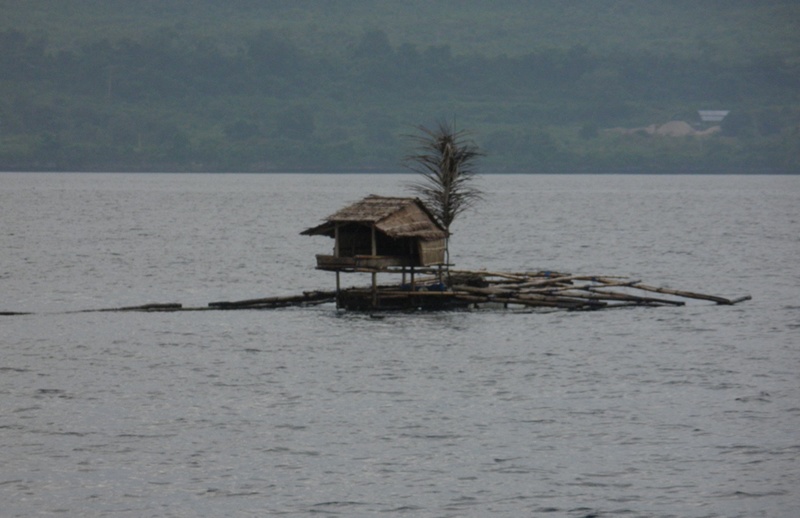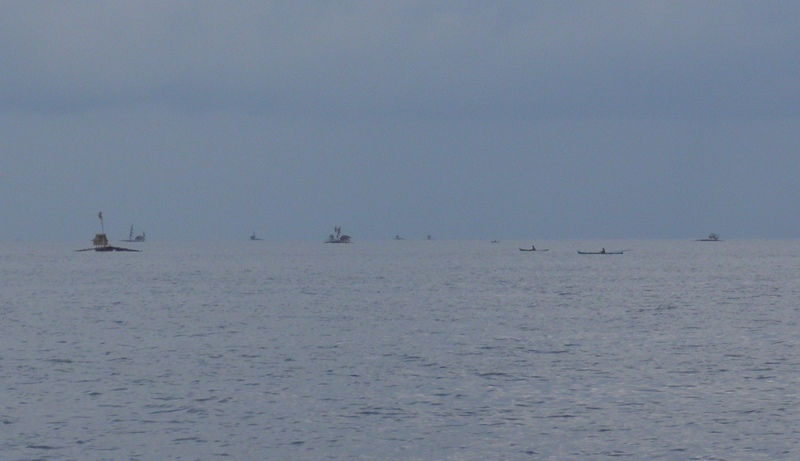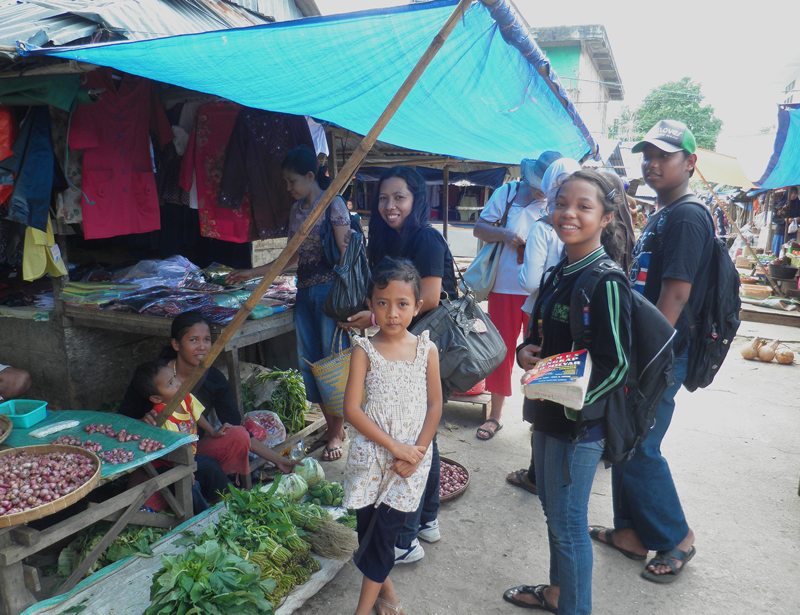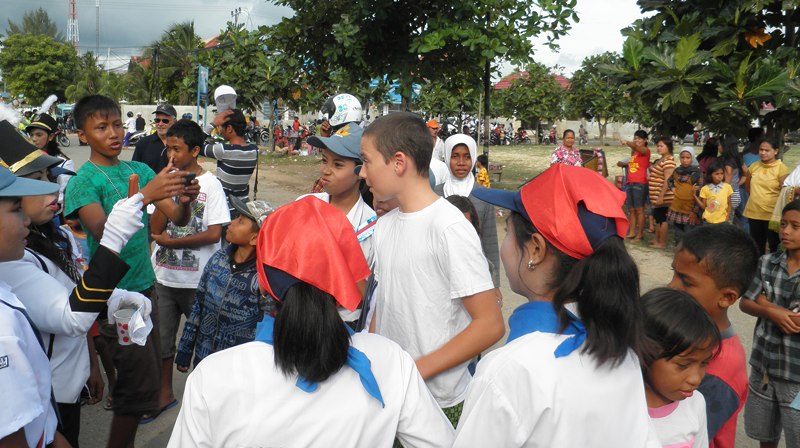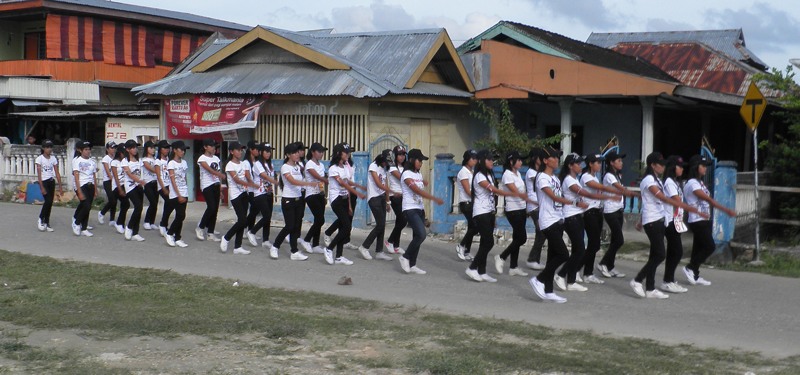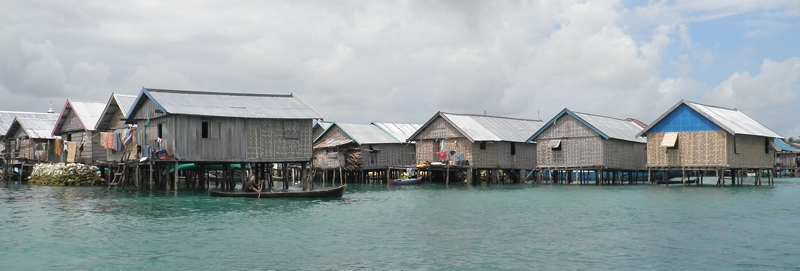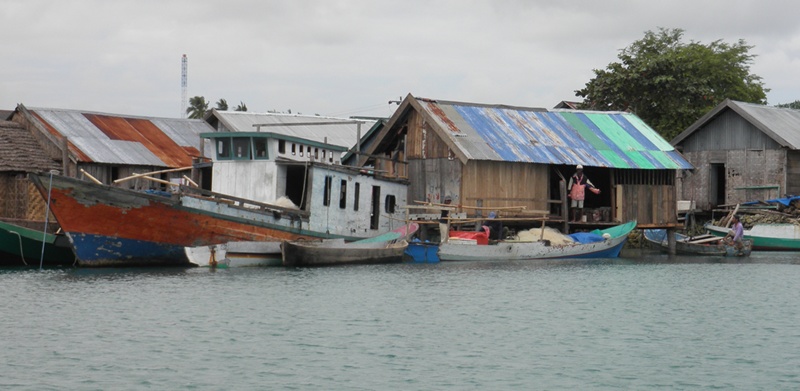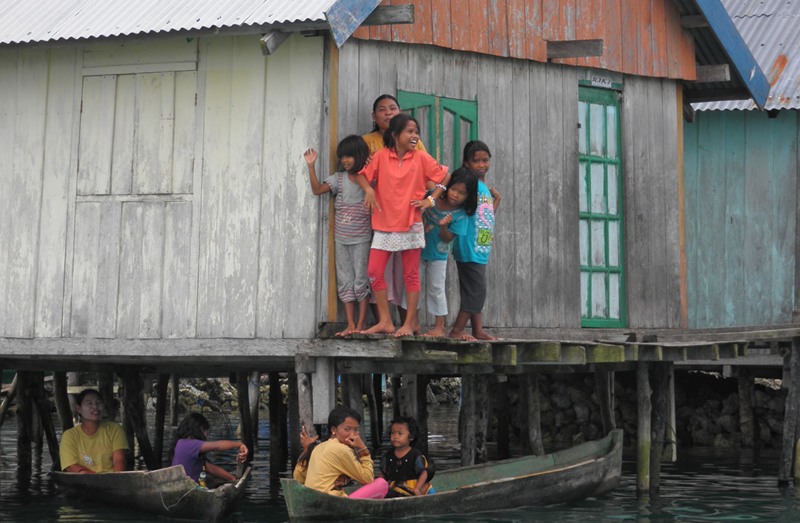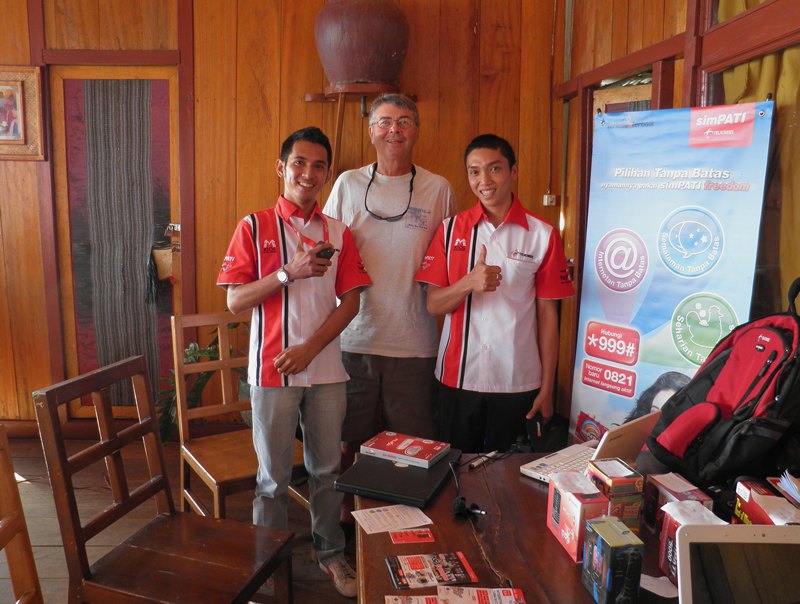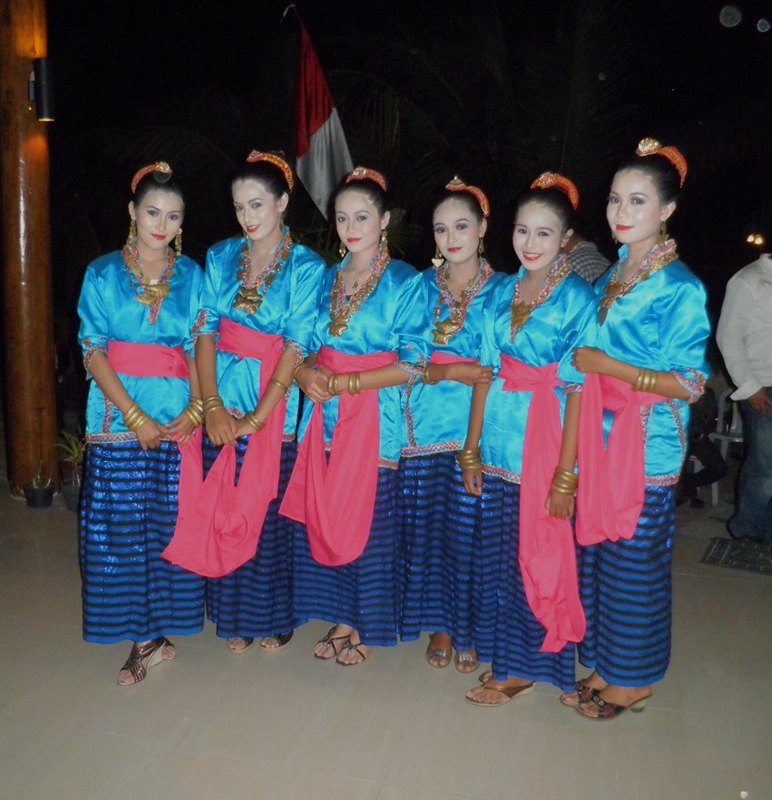Almost Perfect - Wangi Wangi Island, Sulawesi Province, Indonesia

Harmonie
Don and Anne Myers
Fri 20 Aug 2010 21:58
|
05:19.967S 123:31.914E
Almost, but not quite perfect. If it weren't
for that slight altercation at the end, and the constant audio bombardment
of prayers and Indonesian pop music starting at 3am every night over a
loudspeaker we swear was purposely pointed directly at us and the 30
other rally boats filled with infidels in the anchorage, our eleven day
stay in the lagoon off Wangi Wangi Island starting on August 6th would have
been close to perfect.
The two night trip from Ambon to Wangi Wangi Island
wasn't so bad either. Well, except for one little puking over the side
incident - but that happened because it was overcast and there was no moon
and a dark night with no visible horizon always has that effect on me. So
aside from that one little blip, the 280 mile trip was a fast sail, albeit
a little bumpy, with good wind on the beam and rain squalls all around that
never hit us, but enveloped Storyteller and Priscilla on a regular basis.
In the end we were sailing too fast and had to slow down so we wouldn't arrive
before daybreak. We like it when we have to slow down. It's a
million times better than the opposite.
Our arrival at Wangi Wangi Island was a bit of
challenge because none of our collective charts showed any detail and
although we had an anchorage latitude and longitude position from the rally
organizers, we've found that the rally information can't always be
trusted. We were expecting a remote sand and palm tree island surrounded
by reefs for our snorkeling and diving pleasure. Instead we found a
waterfront filled with every kind of funky, colorful Indonesian wooden boat
possible, most of which didn't seem to be seaworthy, but over the course of our
stay, proved otherwise. We also found a town sprawled along the
waterfront occupied by lots and lots of people. Unlike the Pacific,
an uninhabited island is a rare thing in Indonesia. Storyteller, Priscilla
and Harmonie, the first three boats to arrive at Wangi Wangi, decided it was
best to set down anchor in 35 meters outside the town's fringing reef, and
wait. We didn't wait long. It couldn't have been a half hour before
a small official-looking motorboat with four official-looking men came
alongside to greet us. One of the men was the head of tourism for the
area. They welcomed us to Wangi Wangi, handed over a bag filled with
tourist information and indicated we should move into the lagoon and anchor in
the shallower and more protected water there. We did as we were told,
feeling our way through the reef pass on a falling tide with no chart
information. We had a brief encounter with the ground when we
attempted to pass a marker on the wrong side, and our depth gauge read '0' for
most of the way in, but we figured we were doing the rest of the fleet a favor
by digging the channel a little deeper for them with our keel. Once
in, we picked up a mooring and spent the remainder of our 11 day stay in very
calm, flat water.
The pictures tell the story, so here you
go:
Pictures 1 and 2 - Daybreak arrived just as
we rounded the tip of Wangi Wangi Island and were greeted by a floating
city of raftish things (purpose unknown, but must have something to do with
fishing?) and lots of fishermen in wooden canoes.
Picture 3 - Starting with Don's very first shore
excursion and continuing on throughout our 11 day stay, we were greeted by
English speaking guides who did everything from hold the
decrepit wooden ladder leading from the dock platform up to the decrepit
restaurant/rally meeting place perched on stilts, to market vendor translation,
and if we would let them, bag carrying. Gino (pronounced Ghee-no), a local
journalist and good buddy of the local regent (elected official with
responsibility for the Wakatobi group of islands, of which Wangi Wangi
is one), was the designated go-to guy for all things rally
related. Not only did he stay up all night waiting for yachts to
arrive so he could guide them to a mooring, but he seemed to
manage the guides, the tours, all rally events and the purchasing of
water, fuel and Indonesian Bintang beer.
Just a quick side note...
Listening to Gino guide boats in through the reef
pass was highly entertaining. It was all done loudly on VHF channel
16 (normally used only as the hailing channel), so it was hard to
miss. Usually it started with Gino calling the arriving boat. For
example, "Tin Soldier, Tin Soldier, can you hear me please? Can you hear
me please? Can you hear me please?". Gino speaks English fast
and rather unintelligibly, so his radio calls often went unanswered because no
one could figure out what he was saying. This was particularly true
for arriving boats. We found the longer we stayed, the more of
Gino's English we understood. We knew it was time to go when we understood
entire Gino sentences. Anyway, eventually, the arriving boat would realize
that Gino was trying to help them and they would respond. He would then
tell them, "I will come in speed boat, take you to lagoon!". This wouldn't
get a response either - mainly because Gino's "lagoon" sounded like "lag gone",
but when the arriving boat saw Gino's small motorboat approach, they
generally got the message. Gino would then encourage the arriving boat to
follow him through the reef pass. This exchange sounded something like,
"You fallow me! You fallow me! You fallow me to lag gone! Turn
right! Turn lift! Now! Turn lift! No! No! No! You go
street! Ok! Ok! Ok! You sife now! Can throw anchor
over! You chese where to throw anchor! Your chese! Throw
anchor!" To his credit, all thirty-odd boats made it into the 'lag gone'
and anchored safely, Indo-glish language and all.
Back to Picture 3. So, every time we went to
shore, we were met by our Gino supervised, English speaking guides. On
this particular day, Sue, Robin (Storyteller guest) and I went to the market and
were accompanied by four guides and one small girl. They are all pictured
here as they assist Sue with a purchase. Note the book in the teenage
girl's hand - a Indonesian/English dictionary, very handy. Every trip
to the market was an adventure and our little group always caused a stir.
Very few tourists come to this area (we saw none other than rally boaters), so
we were certainly a novelty. We felt very tall as we had to crouch to get
under the blue tarps strung above the stalls and this seemed to provide constant
entertainment for the locals. That, and they probably got a kick
out of the abnormally high prices we paid for our purchases, but who can
complain about paying the equivalent of $.40 for a pound of green
beans?
Picture 4 - We adults might have been
novelties to the locals, but boater kids were really in demand. In the
middle of the crowd, in the white t-shirt is 14-year old Jared, from the
Canadian boat Tin Soldier. The local kids flocked to take his picture with
their cell phones and many a Muslim girl was heard to proclaim, "I'm in
love!!"
Picture 5 - On our third day at Wangi
Wangi, all the boaters were invited to join a parade. When
we first heard about it from our guides, we wondered why we were being invited
to join a 'walking race' as they called it. Something was definitely lost
in the translation there. When it was clear we were being asked to march
in a parade, we gathered our ranks (only about 18 boaters at the time) and
our gaggle of guides and proudly marched in complete disarray behind a very
disciplined group of high school girls in matching outfits (like that seen here)
and in front of a group of male beauty salon workers. We're not entirely
sure what the purpose of the parade was, but we straggled past the regent's
house with its reviewing stand, waving our boats' country of origin flags
high. The response from the crowd as we walked by was phenomenal.
The kids yelled 'Hey Mister!' and laughed and waved like crazy while their
mother's displayed a more conservative version of the same. Even the
men cracked smiles and waved on occasion. This went on for hours and
around every turn were masses of people - a sea of brown faces with white
smiles.
Pictures 6, 7 and 8 - On the fringe of the
main town of Wangi Wangi is the Bajo tribe village. These are people that
live in huts on stilts like those in picture 6, and do all their traveling
by canoe and any other type of floating vehicle like that in picture 7. We
went to see the Bajo village by dinghy along with Claire and Fiona from the
English boat Sa'Vahn. Our two dinghies created quite a to-do as Bajo kids
leapt from hut to hut to follow our progress waving like mad and bellowing
"Hello!" and "Hey Mister!". Here are just a few of our young fans
posing in picture 8 with their moms below them in canoes.
Picture 9 - The local regent, and possibly Gino,
arranged to have these two Telkomsel representatives fly to Wangi Wangi to
provide (sell) cell phone sim cards and internet modems to rally
participants. If this blog update goes through with all 11 pictures
intact, then we have these two to thank. They spent the better part of two
afternoons getting 'Mr. Don' up and running with a new Telkomsel internet modem
that should work everywhere there is a cell phone signal in Indonesia.
When finished, we took pictures of each other in their makeshift office located
in the decrepit restaurant/rally gathering place on stilts.
Picture 10 - The welcome dinner. Hosted by
the regent in the brand new very lovely resort he just happens to
own. It is located about thirty minutes out of town by car, so we were
driven both ways in cars provided by the local government. Quite
a feat given there are very few cars on the island and by that
time, more than 30 boats and 100 boaters had arrived. The dinner was an
excellent buffet - all free, but more than likely the local government paid the
hotel for the service, so the regent made out well. After dinner there was
traditional dancing performed by this group of girls.
Picture 11 - And now about that slight altercation
at the end of our stay. It was Monday, August 16th and we had planned to
stay that afternoon and evening to watch the traditional dance festival, and
then leave very early the next morning at high tide. The dance festival is
something that happens every year on Wangi Wangi Island, but this year,
they moved the date up for our benefit. Unfortunately, Ramadan (the
ninth month of the Muslim year during which Muslims fast from sunrise to
sunset) started the week before and some of the more devout townspeople were not
happy the festival had been rescheduled. We didn't
know this, and although we heard shouting over a loudspeaker that
day as well as several days before, it had blended in with the general
hubbub of prayers and loud music and we didn't give it a second
thought. Even when our guides took us on a long circuitous walking route
from the restaurant on stilts to the festival grounds through back alleys and
neighborhoods that seemed off the beaten track, we didn't sense anything was
amiss. When we arrived at the festival grounds and were led through a
throng of people that seemed less inclined than usual to wave and yell "Hey
Mister!", we still didn't notice anything was wrong. It wasn't until we
were seated comfortably in the chairs reserved for us under a
special awning that we noticed a sudden change in the air. As if a
thousand people held their breath at once while a large group of men and boys in
motorcycle helmets stormed the festival grounds and proceeded to rip down
the ornamental palm frond structure that was to serve as the dancer's
background. It was at this moment that we remembered we were in a third
world country. As we watched the police stand aside while the invaders
ripped at the structure, we wondered, for a minute or two, if the place was
going to erupt into a violent riot. We wondered this as we glanced around
and noticed there were a lot more of them than there were of us. Suddenly
our white faces looked very pale. Probably because they were.
There was some shouting and then things came to a standstill. It was at
this point that everyone started breathing again. We all looked around for
someone to explain to us what just happened and why it happened, but no one was
talking. There was a little more shouting between the helmeted men and the
festival organizers and shortly thereafter, it was announced in English that the
festival had been cancelled and all the Sail Indonesia people should
leave. There was no explanation, no apology, just a directive to
leave.
We and our guides stood, exited the grounds and
made a beeline for the restaurant on stilts. No circuitous route this
time. We realized that our long walk to the festival grounds was necessary
to avoid the large protest that was taking place at the time. Our guides
were working overtime in a collective effort to keep us away from the
fray. On the way back to the restaurant, we pumped our guides and the one
Sail Indonesia representative on site for information. What
we heard was not necessarily the truth because our guides were still
probably trying to gloss over reality, but what we pieced together was
this: holding the festival at 4 pm (before sunset) during Ramadan was
probably a really bad idea. The more devout townspeople were
upset because food was being prepared (for our benefit) before
sunset. It's not clear whether this food would have been served to us
before sunset, but it angered some regardless. Also,
unmarried members of the opposite sex are not supposed to sit next
to each other during Ramadan, and this 'rule' would have been
broken. In general there was discontent with the rescheduling of the
festival for our benefit during Ramadan. We also heard the people were
upset because the wealth we brought to the island was funneled through Gino
and the regent and not shared with the people. There was also
some talk about the regent benefiting from the welcome dinner held at his hotel
the night before - surely the government paid the hotel for the service, so the
regent did well for himself. Lastly, there was mention of the regent's
elected term being up within the year, and general discontent with his
rule. We feel the truth lies in there somewhere, and the bottom
line was that our welcome had ended. We all went straight back to our
boats and as far as we know, the entire fleet cleared out within two days.
We left at dawn the following morning and if the tide were higher at the time,
we would have left as soon as we got back to the boat from the aborted
festival. There was no further trouble that we know of.
It's really too bad that our otherwise very
pleasant stay ended on such a sour note. After being treated
like royalty for three weeks, it was a huge reality check for us.
Getting back to the picture...
This was taken as we were leaving the festival
grounds. Note the helmeted men and boys with arms folded or hands pushed
in pockets. We didn't notice until we looked at this picture that everyone
had a similar stance and many were staring none-too-kindly in our
direction. It's unclear what side the few policemen in the picture were
on. They didn't do anything to hold back the crowd, but maybe
they stood aside to avoid violence? We'll never know,
but are very happy that nothing more than a few stares came our
way.
We've spent the last five days anchored off
less populated Hoga Island just south of Wangi Wangi and all has been
fine. Tomorrow (August 21) we will sail 200 miles southwest to another
small island we've heard is quite nice. After that we'll move
further south to join up with the other half of the Sail Indonesia rally
boats.
More on our five day stay at Hoga Island
later.
Anne
|
